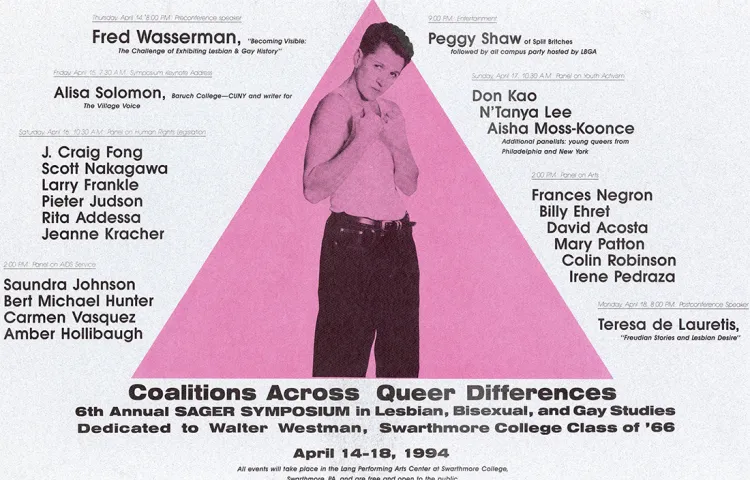Student-led Event Dives Deep Into Swarthmore's Queer History

Poster from the 6th Annual Sager Symposium in Lesbian, Bisexual, and Gay Studies held in 1994.
Last semester, the Inclusive Excellence Fellows at Swarthmore held an event called “Swarthmore's Queer History: A Peek into the Archives,” hosted by college archivist David Obermeyer. Artifacts of Swarthmore’s queer history in the archives consist mostly of news articles, ranging in sources from the international Associated Press to the hyper-local Phoenix, and posters from Sager Series events.
“The materials related to the history of the LGBTQA+ community at Swarthmore College tie the experiences of the present with the past, said Obermayer.” “It helps shine a light on the intersectional issues and activism that have been a fundamental part of life at Swarthmore.”
The oldest article in the archives is a Philadelphia Inquirer article from Jan. 9, 1986, titled “Sexual-Preference Provision Added to Swarthmore Policy,” declaring, “Swarthmore College has amended its equal-opportunity policy to include a prohibition against discrimination in hiring and admissions on the basis of sexual preference.” A story on the same policy change at the College followed in the Chronicle of Higher Education by a few weeks.
Most of the news coverage in the archives dates back to the early ’90s. In March of 1991, a portion of the NAMES Project AIDS Memorial Quilt came to campus, which was covered by Philadelphia Gay News and The Swarthmorean. An exhibit called Until that Last Breath: Women with AIDS was hosted by McCabe Library that same month, and received coverage from the Philadelphia Inquirer.
In December of 1991, Swarthmore released a press release announcing, “Swarthmore Extends Employee Benefits to Gay/Bisexual/Lesbian Partners,” which garnered attention from Gay Chicago and the Delaware County Daily Times (DCDT) and The Phoenix in the following years.
In April of 1993, an incident regarding AIDS-phobic graffiti on campus sparked protests, which were covered by The Philadelphia Inquirer, Au Courant, and DCDT. In August of 1993, a Swarthmore student was kicked out of a Virginia roller-skating rink for skating with another woman “during time reserved for couples,” spawning the headline “Rink Rousts Lesbian Skaters” in the Fairfax Journal.
There’s a large gap in the archive from the mid-’90s until the late 2010s, when Lauren Stokes ’09 wrote two deep dives on Swarthmore’s queer history for the Daily Gazette, which later merged with The Phoenix. Her first focuses specifically on the history of queer chalkings at Swarthmore, whereas the second focuses on queer history at the College more generally.
Non-news items in the archive include a lecture called “Gay at Swarthmore, Then and Now,” given by Charles E. Jackson ’60 in 2010; promotional materials for a panel discussion called “Queer Histories of Swarthmore” featuring Pieter M. Judson ’78, Timothy Stewart-Winter ’01, Nayan Shah ’88, Ali Roseberry-Polier ’14, and Lauren Stokes ’09; and “A Gay Manifesto” by Carl Wittman ’64.
The Sager Series has featured several prominent leaders in the LGBT community since it was established in 1988, sometimes before they even became prominent. Posters in the archive reveal that Amber Hollibaugh spoke at the College as part of the 1994 Sager Series on the theme of “Coalitions Across Difference.” She co-founded the San Francisco Lesbian and Gay History Project and authored My Dangerous Desires: A Queer Girl Dreaming Her Way Home (2000), in addition to her involvement in many struggles for social justice over decades.
José Esteban Muñoz spoke as part of the 1995 Sager Series on the theme, “Queer the Institution / Institutionalize the Queer.” He went on to author Disidentifications: Queers of Color and the Performance of Politics (1999) and Cruising Utopia: the Then and There of Queer Futurity (2009). The following year, Cheryl Dunye was here hosting a special advance screening of her film Watermelon Woman (1996). With this film she became the first out Black lesbian to ever direct a feature film in the U.S.
Most recent Sager Series artists with posters in the archive include author/musician/filmmaker Ivan Coyote, Native poet Crisosto Apache, and trans disability activist and scholar Eli Clare.



